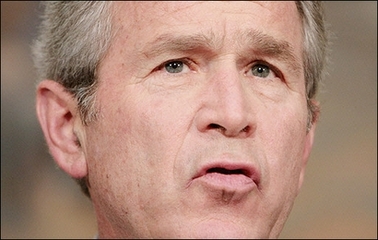No time to leave Iraq: Bush
(agencies)Updated: 2007-03-20 09:15 WASHINGTON - US President George W. Bush warned Monday it was too soon for US troops in Iraq to "pack up and go home" as the war slid into its fifth year clouded by pessimism and political angst on the home front.
Without ever using the word "victory," Bush said after speaking to Iraqi Prime Minister Nuri al-Maliki and the top US military commander in Iraq that his new plan to pacify the war-wracked country could show success in months.
"It could be tempting to look at the challenges in Iraq and conclude our best option is to pack up and go home," Bush said, four years to the day after he announced that American troops were fighting to depose Saddam Hussein.
"That may be satisfying in the short run, but I believe the consequences for American security would be devastating," Bush said, warning that a US departure would spark chaos in Iraq which would engulf the region.
"The terrorists could emerge from the chaos with a safe haven in Iraq to replace the one they had in Afghanistan, which they used to plan the attacks of September 11, 2001," Bush said in an eight-minute televised speech.
The embattled president has vowed to veto an emergency war-funding bill for Iraq and Afghanistan if it reaches his desk still containing language, pushed by Democrats, that calls for US forces to be out of Iraq by September 2008 at the latest.
Bush also warned against expecting easy or quick results from a new US-led, Baghdad-centered security effort which will see more than 21,500 extra troops pour into Iraq to secure the strife-torn capital and restive al-Anbar province.
"The Baghdad security plan is still in its early stages and success will take months, not days or weeks," Bush said in his statement, which preempted regular programing on US television networks and ran on cable news channels.
Democrats, who won back the US Congress in November elections fueled by anger at the war, marked what they called "a series of failures by the Bush administration" in planning and prosecuting the war.
"As the Iraq war enters its fifth year, American troops are still waiting for the Bush administration to present a strategy that will allow them to complete the mission so they can come home," Senate Majority Leader Harry Reid said in a statement.
Bush also paid tribute to the 3,200 US troops "who have given their lives in this struggle" and argued that despite still raging on, the Iraq war had yielded considerable progress.
"Today the world is rid of Saddam Hussein and a tyrant has been held to account for his crimes," while Iraqis have held free elections under a democratic constitution they wrote for themselves, he said.
But a new poll on Monday showed already skeptical US public opinion on Iraq had soured further, with only 32 percent of Americans saying they favored the war, compared with 72 percent just after it began.
Nearly half of those questioned in the survey by Opinion Research Corp. for CNN said they strongly opposed the war. Four years ago only one in five expressed strong opposition.
And despite recent claims by the Bush administration and top generals that the month-old US troop surge was beginning to work, another poll told a story of Iraq skepticism.
Only 18 percent of those polled had confidence in US and coalition troops, while 78 percent opposed their presence, 69 percent said their presence made security worse and 51 percent said attacks on coalition forces were justified.
The poll, commissioned by the BBC, ABC News, ARD German TV and USA, contrasted with a similar survey two years ago when two-thirds of Iraqis were more upbeat.
Still, Bush "reaffirmed his support" for Maliki during their videoconference while the prime minister vowed to implement the security crackdown "in an even-handed manner," White House spokesman Tony Snow said in a statement.
Maliki also emphasized his commitment to push ahead with measures aimed at promoting political reconciliation and economic development, said Snow.
Leaders of the Democratic majority in Congress, meanwhile, were gathering for another week of bombarding Bush with political attacks over the war.
By mid-week, the House of Representatives was due to debate Bush's 124-billion-dollar funding request for the wars in Iraq and Afghanistan.
"The American people have lost confidence in President Bush's plan for a war without end in Iraq. That failed approach has been rejected by the voters in our nation, and it will be rejected by the Congress," said Democratic House Speaker Nancy Pelos.
Democrats last week inserted a clause calling for the withdrawal of US combat troops from Iraq by September 2008 at the latest, but Bush has vowed to veto any such legislation if it makes it to his desk.
The Senate last week voted down a similar attempt by the Democratic leadership intended to bring troops home by the end of March next year.
Anti-war demonstrators planned to hold at least a thousand candlelight vigils around the United States late Monday.
|
||
|
||
|
|

